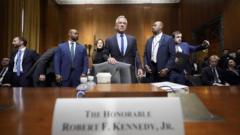Is RFK's Battle with the US Health Agency Capturing Global Attention?

Published: 2025-09-06 00:35:18 | Category: technology
This week, US health secretary Robert Kennedy Jr's fiery Senate testimony has cast a shadow over the credibility and future of the Centers for Disease Control and Prevention (CDC). Following the abrupt firing of CDC director Susan Monarez, Kennedy's controversial statements and actions have raised alarms among public health experts, suggesting a potential shift in the agency's direction that could affect health policies both in the US and globally.
Last updated: 18 September 2023 (BST)
Understanding the Current Crisis at the CDC
As the nation grapples with ongoing public health challenges, the CDC's foundational role in managing infectious diseases and chronic conditions cannot be overstated. Kennedy's recent actions, however, have sparked concerns about the integrity and future of the agency tasked with safeguarding American health. Here are some key takeaways from this unfolding situation:
- Health Secretary Robert Kennedy Jr has been vocal about his lack of trust in the CDC, even labelling it as "corrupt."
- The sudden dismissal of CDC director Susan Monarez has led to significant staff resignations, raising questions about agency stability.
- Kennedy's controversial views on vaccines have alarmed public health experts, particularly his hiring of vaccine critics.
- The CDC's advisory panel on vaccines has been restructured, potentially jeopardising the quality of health recommendations.
- Ongoing developments may impact global health policies and preparedness for future pandemics.
What is the CDC and Its Role?
Established in 1946, the CDC is a pivotal public health agency in the United States. Its mission encompasses tracking and responding to emerging infectious diseases, managing chronic conditions such as heart disease and cancer, and providing guidance on vaccinations. The agency operates over 200 specialised laboratories and employs approximately 13,000 staff members. Over recent years, however, staffing levels have decreased, notably by about 2,000 positions under the Trump administration.
While the CDC does not approve or licence vaccines—that responsibility falls to the Food and Drug Administration (FDA)—it plays a crucial role in crafting recommendations for vaccine distribution and monitoring their safety. This is conducted through a dedicated panel known as the Advisory Committee on Immunization Practices (ACIP), which consists of experts in various fields related to public health.
The Fallout from Susan Monarez's Dismissal
Kennedy's decision to fire Monarez just 29 days into her tenure has raised eyebrows and prompted a wave of resignations among senior CDC staff. This includes the chief medical officer, the director of immunisation, and the director of emerging diseases. The mass exodus has left the agency in a precarious position, potentially undermining its ability to respond effectively to health crises.
In a statement following her dismissal, Monarez disclosed that Kennedy had instructed her to "pre-approve" recommendations from the ACIP, a directive she found deeply troubling. She emphasised the importance of ensuring rigorous scientific review of the panel’s recommendations rather than allowing them to be rubber-stamped. Her concerns highlighted the potential dangers of compromising the CDC’s scientific integrity, particularly in vaccination policies that affect public health on a national scale.
Kennedy's Controversial Stance on Vaccines
Robert Kennedy Jr's history as an activist against vaccines has raised significant concerns among public health officials. His organisation, Children's Health Defense, has consistently questioned the safety and efficacy of vaccinations. Among his most alarming claims is the assertion that the Covid vaccine is "the most deadly in history" and that vaccines contribute to rising autism rates—a theory that has been thoroughly debunked by extensive scientific research.
His administration's early actions have mirrored these controversial views. For instance, he has hired David Geier, a noted vaccine critic, to reassess CDC data related to the spurious link between vaccines and autism. This move has further alarmed health professionals, who worry that such actions might compromise the CDC's evidence-based approach to vaccination.
Impact on the ACIP and Vaccine Recommendations
Kennedy's recent dismissal of the entire ACIP panel has alarmed many in the public health community. Accusing the previous members of having "persistent conflicts of interest," he appointed a new committee that aligns more closely with his views. This new panel now holds the power to alter critical recommendations related to immunisations, including those for childhood vaccines.
This restructuring raises significant questions about the future of vaccine policy in the US. The CDC, while ultimately responsible for accepting or rejecting the committee's recommendations, may face pressure to conform to the new administration's agenda, potentially compromising the scientific integrity that has long underpinned its operations.
The Broader Implications for Public Health
Kennedy's actions and rhetoric have sparked widespread concern about the future of public health in the United States. As the CDC has historically played a vital role in global health initiatives—from responding to pandemics such as Ebola to addressing chronic conditions like heart disease—this turmoil could have far-reaching consequences beyond US borders.
Experts have warned that undermining the CDC may leave the US ill-prepared for future health emergencies. Dr Fiona Havers, a former senior vaccine researcher at the agency, expressed her fears about the implications of drastically reducing the CDC's capabilities: "Taking a sledgehammer to the CDC and undercutting its programmes has left the US much less prepared for another pandemic.”
The Future of the CDC and Global Health
As interim director Jim O'Neill steps into his role, there is a palpable sense of uncertainty about the agency's direction. O'Neill, who has a background in business rather than scientific research, has stated the need for the CDC to regain public trust after previous administrations' missteps. His appointment is seen as a continuation of Kennedy's agenda, which may further alienate seasoned public health professionals.
With the CDC's new vaccine advisory panel set to convene on 18 September to discuss Covid vaccines and other immunisations, the scrutiny around their recommendations will be intense. The outcomes of this meeting will likely reverberate well beyond the US, influencing global health policies and practices.
Conclusion: A Pivotal Moment for Public Health
The current turmoil at the CDC represents a critical juncture for public health in the United States. With the potential for significant changes to vaccination policies and a restructured advisory panel, the implications for public health both domestically and globally are profound. As the world watches how the CDC navigates this complex landscape, the overarching concern remains: will the agency uphold its commitment to science and evidence-based health policy, or will it succumb to political pressures?
As we await the outcomes of the upcoming advisory panel meeting, the question remains: how will the CDC restore its credibility and continue to protect public health in the face of these challenges? #PublicHealth #CDC #VaccinationPolicy
FAQs
What is the CDC's primary role?
The CDC's primary role is to track and respond to infectious diseases, manage chronic health conditions, and provide guidance on vaccinations in the United States.
Why was Susan Monarez fired from the CDC?
Susan Monarez was dismissed by Robert Kennedy Jr after reportedly being instructed to pre-approve recommendations from the CDC's Advisory Committee on Immunization Practices, raising concerns about scientific integrity.
What concerns do public health experts have regarding Kennedy's leadership?
Public health experts are concerned that Kennedy's controversial views on vaccines and his restructuring of the CDC's advisory panels could compromise the agency's scientific integrity and public trust.
How has the CDC's staffing changed recently?
The CDC's staffing has decreased significantly, with around 2,000 positions cut since the Trump administration, leading to concerns about the agency's capacity to respond to health crises.
What is the significance of the CDC's vaccine advisory panel?
The CDC's vaccine advisory panel, the ACIP, plays a crucial role in making recommendations on vaccination policies in the US, which can affect public health outcomes significantly.



